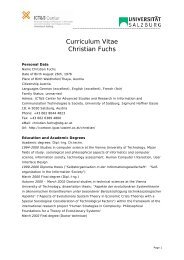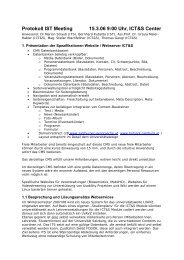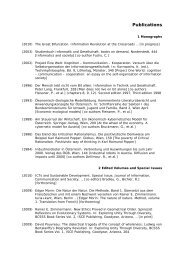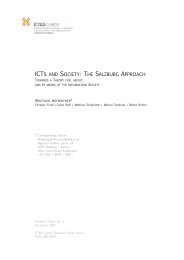CHRISTIAN FUCHS - ICT&S - Universität Salzburg
CHRISTIAN FUCHS - ICT&S - Universität Salzburg
CHRISTIAN FUCHS - ICT&S - Universität Salzburg
You also want an ePaper? Increase the reach of your titles
YUMPU automatically turns print PDFs into web optimized ePapers that Google loves.
Christian Fuchs: Social Networking Sites and the Surveillance SocietyThese statistics show that there is a large interest in SNS in the global Internet public,also in the German-speaking world. This interest is also reflected in a rising amount ofacademic studies of SNS. danah boyd has gathered a collection of research about SNS(http://www.danah.org/SNSResearch.html, accessed on October 20, 2008) that listsapproximately 150 research papers, 3 books, and 7 research reports published in theyears 2003-2008. None of these papers covers the German-speaking world or hasGerman-speaking authors. This shows a lack of research that concerns Austria,Germany, and Switzerland. Therefore the overall motivation for conducting this study isto contribute to research about social networking sites in the German-speaking world.The specific research questions that are addressed in this study are:• How does economic and political surveillance frame social networking site usage?• How knowledgeable are students about surveillance in society?• How critical are students about the potential surveillance by state and corporation?• How does the degree of knowledge about surveillance and the degree of criticalconsciousness on surveillance influence the usage of social networking sites?SNS are generally focused on young people as target audience. The statistics for theGerman-speaking world show that studiVZ (studi=students, VZ=Verzeichnis=list, list ofstudents) is a tremendously popular platform. It has been specifically designed as a SNSfor students. One of the reasons why this case study is focusing on students is thepopularity of SNS among this group. Another reason is that students are traditionally avery critical group in society. 40 years ago, in 1968, student protests reached theirclimax, especially in France, Germany, and the United States. Topics that werequestioned by the protesters included imperialism and the war in Vietnam, a lack ofdemocracy in universities, capitalist consumer culture, standardized Fordist life styles,conservative values, and post-fascists structures. The students’ movement and the NewLeft did not reach the size of a revolutionary movement; nonetheless their activities canbe interpreted as anti-capitalist rebellion. Herbert Marcuse (1969: x) argued in thiscontext that “they have taken the idea of revolution out of the continuum of repressionand placed it into its authentic dimension: that of liberation”. Forty years have passed,capitalist society has changed, neoliberalism has resulted in a large-scaleeconomization and capitalization of society that has also permeated universities andthe academic system. Given these circumstances, how important is critical thinking forstudents today? And how does it influence students’ attitudes towards new media suchas social networking platforms?2. Social Networking Sites, Web 2.0, Social SoftwareSocial networking sites are frequently discussed in relation with the categories of Web2.0 and social software that seem to be a little bit more general than the category ofSNS. SNS, just like blogs or wikis, are frequently seen as types of web 2.0 and as socialsoftware. However, all of these terms have thus far rather remained vague, which is dueto a lack of theoretical foundations (Fuchs 2009).Some authors tend to argue that the web and software are always social because theyincorporate certain meanings and understandings of society (Dourish 2001,Dringenberg 2002, Rost 1997). Their understanding of the social is close to Durkheim’snotion of social facts (Fuchs 2009), by which he means4









